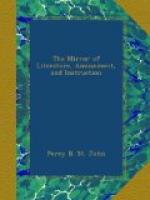G.W.N.
* * * * *
PORTRAIT OF CHRIST.
(To the Editor.)
The document giving an account of Jesus Christ, which is referred to by Veritas, in No. 533 of The Mirror, has been long since known to be a glaring forgery. It is one of many stories invented in the second, third, and fourth centuries, by the early Christians; for a full account of whose forgeries in such matters, you may consult Mosheim, Lardner, Casaubon, and other ecclesiastical writers. The latter says, “It mightily affects me to see how many there were in the earliest times of the church, who considered it as a capital exploit to lend to heavenly truth the help of their own inventions, in order that the new doctrine might be more readily allowed by the wise among the Gentiles. These officious lies, they were wont to say, were devised for a good end. From which source, beyond question, sprung nearly innumerable books, which that and the following ages saw published by those who were far from being bad men, under the name of the Lord Jesus Christ, and of the Apostles, and of other Saints.”—Lardner, vol. iv. p. 524.
Dr. Mosheim, among his excellent works, has published a dissertation, showing the reasons and causes of these supposed letters and writings respecting Christ, the Apostles, &c., to which I would beg to recommend your correspondent Veritas. JUSTUS.
* * * * *
NOTES OF A READER.
* * * * *
DEATH OF JOHN HAMPDEN.
The last days of the patriot Hampden are thus graphically told in the Edinburgh Review of Lord Nugent’s recently published “Memorials.” We need scarcely observe, by way of introduction, that Hampden fell in the great contest between Charles and his parliament; and that when the appeal was to the sword, Hampden accepted the command of a regiment in the parliamentary army, under the Earl of Essex; the Royal forces being headed by Prince Rupert.
“In the early part of 1643, the shires lying in the neighbourhood of London, which were devoted to the cause of the Parliament, were incessantly annoyed by Rupert and his cavalry. Essex had extended his lines so far, that almost every point was vulnerable. The young prince, who, though not a great general, was an active and enterprising partisan, frequently surprised posts, burned villages, swept away cattle, and was again at Oxford, before a force sufficient to encounter him could be assembled.
“The languid proceedings of Essex were loudly condemned by the troops. All the ardent and daring spirits in the parliamentary party were eager to have Hampden at their head. Had his life been prolonged, there is every reason to believe that the supreme command would have been entrusted to him. But it was decreed that, at this conjuncture, England should lose the only man who united perfect disinterestedness to eminent talents—the only man who, being capable of gaining the victory for her, was incapable of abusing that victory when gained.




